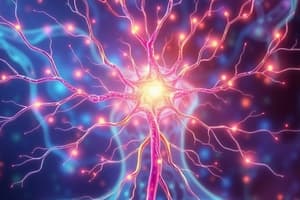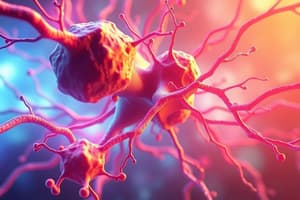Podcast
Questions and Answers
Which of the following medications is primarily used as a tocolytic agent?
Which of the following medications is primarily used as a tocolytic agent?
- Ritodrine (correct)
- Salmeterol
- Methylphenidate
- Mirabegron
What is the main therapeutic use of Mirabegron?
What is the main therapeutic use of Mirabegron?
- Uterine relaxation during pregnancy
- Treatment of bronchial asthma
- Attention deficit hyperactivity disorder
- Overactive bladder management (correct)
Which of the following drugs is commonly associated with tachyphylaxis upon repeated dosing?
Which of the following drugs is commonly associated with tachyphylaxis upon repeated dosing?
- Amphetamines (correct)
- Atomoxetine
- Modafinil
- Levalbuterol
Which drug would be most appropriate for treating a patient with ADHD who requires a non-stimulant option?
Which drug would be most appropriate for treating a patient with ADHD who requires a non-stimulant option?
Based on its effects on the cardiovascular system, which medication is the vasopressor of choice during pregnancy?
Based on its effects on the cardiovascular system, which medication is the vasopressor of choice during pregnancy?
Which of the following statements about amphetamines is incorrect?
Which of the following statements about amphetamines is incorrect?
Which of the following is a risk associated with Pemoline?
Which of the following is a risk associated with Pemoline?
Which of the following actions best describes the mechanism of indirectly acting sympathomimetics?
Which of the following actions best describes the mechanism of indirectly acting sympathomimetics?
What type of drug would increase heart rate by mimicking the sympathetic nervous system?
What type of drug would increase heart rate by mimicking the sympathetic nervous system?
Which of the following receptor types is NOT primarily associated with the sympathetic nervous system?
Which of the following receptor types is NOT primarily associated with the sympathetic nervous system?
What is the main effect of stimulating alpha1 adrenergic receptors?
What is the main effect of stimulating alpha1 adrenergic receptors?
Which type of drug action produces opposing responses in the same organ?
Which type of drug action produces opposing responses in the same organ?
Which receptor subtype would primarily mediate the response to a drug that stimulates the sympathetic system causing decreased activity in the gastrointestinal tract?
Which receptor subtype would primarily mediate the response to a drug that stimulates the sympathetic system causing decreased activity in the gastrointestinal tract?
What happens when acetylcholine is inactivated by acetylcholinesterase before reaching receptor cells?
What happens when acetylcholine is inactivated by acetylcholinesterase before reaching receptor cells?
Which drug type would block signals from the parasympathetic nervous system?
Which drug type would block signals from the parasympathetic nervous system?
Which adrenergic receptor type is widely distributed in blood vessels and is primarily responsible for vasoconstriction?
Which adrenergic receptor type is widely distributed in blood vessels and is primarily responsible for vasoconstriction?
What is the primary action of dopamine at a dose of 1-2 µg/kg/min?
What is the primary action of dopamine at a dose of 1-2 µg/kg/min?
Which agent is primarily used to increase blood pressure in hypotensive states?
Which agent is primarily used to increase blood pressure in hypotensive states?
Which of the following medications is a selective β₁ agonist?
Which of the following medications is a selective β₁ agonist?
What is a common side effect associated with prolonged use of nasal decongestants like naphazoline?
What is a common side effect associated with prolonged use of nasal decongestants like naphazoline?
Which agent is known for its use in the treatment of glaucoma?
Which agent is known for its use in the treatment of glaucoma?
What is one of the uses of clonidine beyond hypertension treatment?
What is one of the uses of clonidine beyond hypertension treatment?
What condition is Midodrine, a prodrug, used to treat?
What condition is Midodrine, a prodrug, used to treat?
Which medication is contraindicated due to the risk of hemorrhagic stroke?
Which medication is contraindicated due to the risk of hemorrhagic stroke?
What primary function does the autonomic nervous system (ANS) perform?
What primary function does the autonomic nervous system (ANS) perform?
Which neurotransmitter is primarily associated with the sympathetic nervous system?
Which neurotransmitter is primarily associated with the sympathetic nervous system?
What distinguishes the efferent pathways of the autonomic nervous system?
What distinguishes the efferent pathways of the autonomic nervous system?
In contrast to the autonomic nervous system, what type of control does the somatic nervous system provide?
In contrast to the autonomic nervous system, what type of control does the somatic nervous system provide?
Identify the receptors associated with the adrenergic system.
Identify the receptors associated with the adrenergic system.
What is the role of afferent neurons in the autonomic nervous system?
What is the role of afferent neurons in the autonomic nervous system?
Which system is responsible for promoting 'rest and digest' functions in the body?
Which system is responsible for promoting 'rest and digest' functions in the body?
Which of the following accurately describes the autonomic nervous system?
Which of the following accurately describes the autonomic nervous system?
What is the primary action of selective alpha1 blockers?
What is the primary action of selective alpha1 blockers?
Which of the following is a characteristic of phenoxybenzamine?
Which of the following is a characteristic of phenoxybenzamine?
Which condition is primarily treated using selective alpha1 blockers?
Which condition is primarily treated using selective alpha1 blockers?
What adverse effect is commonly associated with the first few doses of selective alpha1 blockers?
What adverse effect is commonly associated with the first few doses of selective alpha1 blockers?
Which drug is specifically used to prevent hypertensive episodes in pheochromocytoma?
Which drug is specifically used to prevent hypertensive episodes in pheochromocytoma?
What is a notable difference between nonselective and selective alpha-blockers regarding tachycardia?
What is a notable difference between nonselective and selective alpha-blockers regarding tachycardia?
Which selective alpha1 blocker has a unique action on prostatic receptors?
Which selective alpha1 blocker has a unique action on prostatic receptors?
What is a potential effect of long-term use of selective alpha1 blockers?
What is a potential effect of long-term use of selective alpha1 blockers?
What effect does stimulation of beta1 receptors have on the body?
What effect does stimulation of beta1 receptors have on the body?
Which receptor is primarily responsible for bronchodilation?
Which receptor is primarily responsible for bronchodilation?
What is one of the main roles of dopaminergic receptors in the body?
What is one of the main roles of dopaminergic receptors in the body?
How are neurotransmitters primarily inactivated after their function?
How are neurotransmitters primarily inactivated after their function?
Which enzymes are responsible for the degradation of norepinephrine in the body?
Which enzymes are responsible for the degradation of norepinephrine in the body?
Which functional effects are associated with the stimulation of beta2 receptors?
Which functional effects are associated with the stimulation of beta2 receptors?
What role does reuptake play in the inactivation of norepinephrine?
What role does reuptake play in the inactivation of norepinephrine?
What mnemonic aids in remembering the functions of beta1 and beta2 receptors?
What mnemonic aids in remembering the functions of beta1 and beta2 receptors?
Flashcards
What is the CNS?
What is the CNS?
The central nervous system (CNS) is made up of the brain and spinal cord.
What is the PNS?
What is the PNS?
The peripheral nervous system (PNS) is located outside the brain and spinal cord and has two branches: the autonomic and somatic.
What does the ANS control?
What does the ANS control?
The autonomic nervous system (ANS), also called the visceral system, acts on smooth muscles and glands. Its main function is to control and regulate organs like the heart, lungs, stomach, and bladder.
What does the somatic nervous system control?
What does the somatic nervous system control?
Signup and view all the flashcards
What's the sympathetic nervous system's role?
What's the sympathetic nervous system's role?
Signup and view all the flashcards
What's the parasympathetic nervous system's role?
What's the parasympathetic nervous system's role?
Signup and view all the flashcards
How do the sympathetic and parasympathetic systems interact?
How do the sympathetic and parasympathetic systems interact?
Signup and view all the flashcards
How do drugs affect the autonomic nervous system?
How do drugs affect the autonomic nervous system?
Signup and view all the flashcards
What are Beta1 receptors and where are they located?
What are Beta1 receptors and where are they located?
Signup and view all the flashcards
What are Beta2 receptors and their role in the lungs?
What are Beta2 receptors and their role in the lungs?
Signup and view all the flashcards
How do Beta2 receptors affect the gastrointestinal tract?
How do Beta2 receptors affect the gastrointestinal tract?
Signup and view all the flashcards
What is norepinephrine and what does it do to blood vessels?
What is norepinephrine and what does it do to blood vessels?
Signup and view all the flashcards
What is the effect of stimulating alpha receptors on blood pressure?
What is the effect of stimulating alpha receptors on blood pressure?
Signup and view all the flashcards
Where are dopaminergic receptors located and what is their role in blood flow?
Where are dopaminergic receptors located and what is their role in blood flow?
Signup and view all the flashcards
What is the main way norepinephrine is inactivated?
What is the main way norepinephrine is inactivated?
Signup and view all the flashcards
What enzymes break down norepinephrine?
What enzymes break down norepinephrine?
Signup and view all the flashcards
Cholinergic Receptors
Cholinergic Receptors
Signup and view all the flashcards
Acetylcholine and Acetylcholinesterase
Acetylcholine and Acetylcholinesterase
Signup and view all the flashcards
Opposite Effects of Sympathetic and Parasympathetic Mimics
Opposite Effects of Sympathetic and Parasympathetic Mimics
Signup and view all the flashcards
Effects on Heart Rate
Effects on Heart Rate
Signup and view all the flashcards
Similar Effects from Mimicry and Blocking
Similar Effects from Mimicry and Blocking
Signup and view all the flashcards
Sympathomimetics
Sympathomimetics
Signup and view all the flashcards
Adrenergic Receptor Locations
Adrenergic Receptor Locations
Signup and view all the flashcards
Alpha1-Adrenergic Receptor Effects
Alpha1-Adrenergic Receptor Effects
Signup and view all the flashcards
Beta-2 agonists
Beta-2 agonists
Signup and view all the flashcards
Indirectly acting sympathomimetics
Indirectly acting sympathomimetics
Signup and view all the flashcards
Mixed action sympathomimetics
Mixed action sympathomimetics
Signup and view all the flashcards
Tachyphylaxis
Tachyphylaxis
Signup and view all the flashcards
Mirabegron
Mirabegron
Signup and view all the flashcards
Methylphenidate
Methylphenidate
Signup and view all the flashcards
Modafinil
Modafinil
Signup and view all the flashcards
Ephedrine
Ephedrine
Signup and view all the flashcards
Sympatholytic Drugs
Sympatholytic Drugs
Signup and view all the flashcards
Nonselective Alpha-Blockers
Nonselective Alpha-Blockers
Signup and view all the flashcards
Phenoxybenzamine
Phenoxybenzamine
Signup and view all the flashcards
Selective Alpha1-Blockers
Selective Alpha1-Blockers
Signup and view all the flashcards
Lesser Tachycardia
Lesser Tachycardia
Signup and view all the flashcards
Favorable Lipid Profile
Favorable Lipid Profile
Signup and view all the flashcards
Improved Urinary Flow
Improved Urinary Flow
Signup and view all the flashcards
Postural Hypotension
Postural Hypotension
Signup and view all the flashcards
What is dopamine's role in cardiogenic shock with oliguric renal failure?
What is dopamine's role in cardiogenic shock with oliguric renal failure?
Signup and view all the flashcards
Compare dopamine and norepinephrine’s impact on renal function in cardiogenic shock?
Compare dopamine and norepinephrine’s impact on renal function in cardiogenic shock?
Signup and view all the flashcards
What is dobutamine’s primary effect and its unique characteristic?
What is dobutamine’s primary effect and its unique characteristic?
Signup and view all the flashcards
Describe the combined effects of dopexamine and how it works.
Describe the combined effects of dopexamine and how it works.
Signup and view all the flashcards
What is fenoldopam's application and its specific mechanism of action?
What is fenoldopam's application and its specific mechanism of action?
Signup and view all the flashcards
What are the applications and risks of using α1 agonists as nasal decongestants?
What are the applications and risks of using α1 agonists as nasal decongestants?
Signup and view all the flashcards
What are the therapeutic applications of α2 agonists, particularly clonidine?
What are the therapeutic applications of α2 agonists, particularly clonidine?
Signup and view all the flashcards
How are selective α2 agonists, like apraclonidine and dexmedetomidine, therapeutically applied?
How are selective α2 agonists, like apraclonidine and dexmedetomidine, therapeutically applied?
Signup and view all the flashcards
Study Notes
Autonomic Nervous System Agents
- The central nervous system (CNS) is the body's primary nervous system, including the brain and spinal cord.
- The peripheral nervous system (PNS) is outside the CNS and has two divisions: autonomic and somatic.
- The autonomic nervous system (ANS) controls involuntary functions like heart rate and digestion, affecting smooth muscles and glands.
- The somatic nervous system controls voluntary actions, impacting skeletal muscles.
- The ANS has afferent (sensory) and efferent (motor) neurons.
- Efferent pathways are divided into sympathetic and parasympathetic branches.
- The sympathetic and parasympathetic systems act on the same organs but create opposing responses for homeostasis.
Sympathetic Nervous System
- Also known as the adrenergic system, once believed to use adrenaline as the neurotransmitter.
- The primary neurotransmitter is norepinephrine.
- Adrenergic receptors include alpha1, alpha2, beta1, and beta2.
- Norepinephrine is released from nerve endings, stimulating cell receptors.
Parasympathetic Nervous System
- Also called the cholinergic system, primarily uses acetylcholine as the neurotransmitter between neurons and the target organ.
- Cholinergic receptors are either nicotinic or muscarinic, activating by nicotine and muscarine, respectively.
- Acetylcholinesterase breaks down acetylcholine to prevent prolonged action.
- Drugs mimicking these neurotransmitters produce opposite effects in organs.
Sympathetic and Parasympathetic Responses to Drugs
- Sympathomimetics (mimic sympathetic) and parasympathomimetics (mimic parasympathetic) cause opposite responses.
- Sympatholytics (block sympathetic) and parasympatholytics (block parasympathetic) can cause similar results in certain organs.
- Sympathetic and parasympathetic responses have opposite effects on various body parts (e.g., pupils dilate/constrict, bronchi dilate/constrict etc).
Adrenergic Agonists
- Drugs stimulating the sympathetic system, mimicking norepinephrine and epinephrine.
- Act on adrenergic receptor sites (alpha1, alpha2, beta1, and beta2) in various organs.
- Alpha receptors found in blood vessels, eye, bladder, prostate, constricting arterioles, increasing blood pressure/improved circulation
- Alpha2 receptors located in postganglionic endings, inhibiting norepinephrine release, leading to less vasoconstriction and reduced blood pressure.
- Beta1 receptors predominantly in the heart, increasing myocardial contractility and heart rate. Receptors also located in the kidney impacting blood pressure.
- Beta2 receptors located in lungs, liver and uterine muscle. Relax smooth muscle, causing bronchodilation, decreasing GI tone/motility, increasing blood glucose, and relaxing uterine muscle.
Inactivation of Neurotransmitters
- Neurotransmitter action is terminated by reuptake, enzymatic degradation (e.g., MAO, COMT), or diffusion.
- Drugs can prolong neurotransmitter action by inhibiting reuptake or degradation.
Directly Acting Sympathomimetics
- Catecholamines (e.g., adrenaline) and non-catecholamines (e.g., isoprenaline) directly stimulate alpha and beta receptors.
- Adrenaline is a crucial drug for anaphylactic shock, given intramuscularly.
Indirectly Acting Sympathomimetics
- These drugs increase norepinephrine in the synapse by blocking reuptake or releasing it from storage vesicles.
- Tyramine and methylphenidate are examples. Methylphenidate is used for ADHD.
Mixed Action Sympathomimetics
- Drugs with both direct and indirect effects on sympathetic activity.
- Ephedrine and pseudoephedrine are examples, found in cold remedies.
Sympatholytic Drugs - Alpha Blockers
- These drugs, in particular phenoxybenzamine (irreversible), phentolamine, and tolazoline (reversible), block alpha receptors.
- Non-selective alpha blockers result in vasodilation and postural hypotension.
- Selective alpha1-blockers such as prazosin and terazosin are useful for benign prostatic hyperplasia (BPH) due to relaxation of the prostate and urethra, impacting blood pressure to a lesser degree than non-selective blockers.
Studying That Suits You
Use AI to generate personalized quizzes and flashcards to suit your learning preferences.




